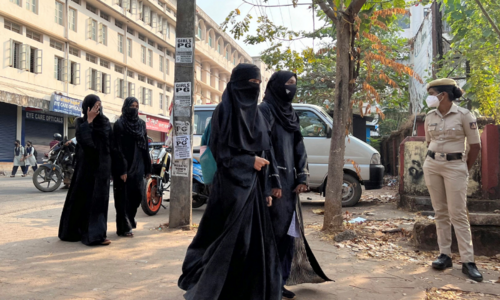India court upholds Karnataka state's ban on hijab, says it is not essential to Islam


An Indian court on Tuesday upheld a ban on the hijab in class in the state of Karnataka, observing that the headscarf was not essential to Islam, several Indian media outlets reported.
The ruling might have a bearing in the rest of the country that has a big Muslim minority.
“Prescription of uniform is a reasonable restriction on fundamental rights,” a three-judge bench headed by Karnataka High Court Chief Justice Ritu Raj Awasthi said.
The court had on Feb 10 told students not to wear any religious clothing until it delivers a verdict on petitions seeking to overturn a ban on hijabs.
Hours after the verdict was issued today, a student challenged it in the Supreme Court, NDTV reported.
The dispute began in January when a government-run school in Karnataka's Udupi district barred students wearing hijabs from entering classrooms, triggering protests by Muslims who said they were being deprived of their fundamental rights to education and religion. That led to counterprotests by Hindu students wearing saffron shawls, a colour closely associated with that religion and favoured by Hindu nationalists.
More schools in the state followed with similar bans and the state's top court disallowed students from wearing hijab and any religious clothing pending a verdict.
Ahead of the verdict, the Karnataka government banned large gatherings for a week in state capital Bengaluru to maintain public peace and order, and declared a holiday on Tuesday in schools and colleges in Udupi.
The hijab is worn by many Muslim women to maintain modesty or as a religious symbol, often seen as not just a bit of clothing but something mandated by their faith.
Hijab restrictions have surfaced elsewhere, including France, which in 2004 banned them in schools.
But in India, where Muslims make up 14 per cent of the country's 1.4 billion people, the hijab has historically been neither prohibited nor limited in public spheres. Women donning the headscarf is common across the country, which has religious freedom enshrined in its national charter with the secular state as a cornerstone.
Some rights activists have voiced concerns that the ban could increase Islamophobia. Violence and hate speech against Muslims have increased under Prime Minister Narendra Modi's governing Hindu nationalist party, which also governs Karnataka state.


































